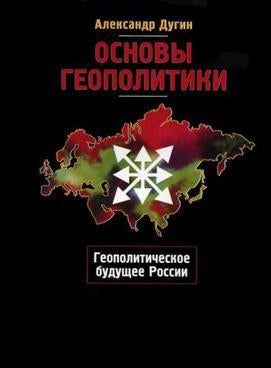
欢迎关注《新俄罗斯笑话》系列,热更中。
Tanaka Memorial for the 21st Century, Excerpts from "The Foundations of Geopolitics: Russia's Geopolitical Future"
China should "must be dismantled as much as possible", using Tibet-Xinjiang-Inner Mongolia-Manchuria as a safety belt.
As geopolitical compensation, help should be provided to China to the south - Indochina (except Vietnam), the Philippines, Indonesia, Australia".
About the book and author:
After reading the above text, do you feel familiar, thinking that it was a strategic plan made by a Japanese militarist in the early 20th century?
However, this is actually an excerpt from the 1997 Philosopher and Political Theorist Alexander Dugin, who is known as the Imperial Russian School's 1 National Teacher The Foundations of Geopolitics: The Geopolitical Future of Russia.
Dukin has close ties in the Kremlin and the Russian military, and is the chief adviser to Sergey Naryshkin, the former chairman of the Russian State Duma and a key member of the United Russia party. He is also a professor of sociology and international relations at Moscow State University. He is known as a mysterious figure on the list of Western sanctions against Russian dignitaries, and is also speculated by many to be the theoretical guide of Putin's policy towards Ukraine. Because Putin has repeatedly mentioned the influence of Dukin's book on him in public. According to Dukin himself, after Naryshkin became the chairman of the Duma, the book was used as a textbook and a compulsory course by many Russian educational institutions .
Since there is no scholar to translate this book into the Chinese version, I can only find the download address of the Russian version on the Internet. I will attach the reading address 2 at the end of the text.
The following are excerpts from the core ideas:
1. East Prussia is handed over to Germany to establish the Moscow-Berlin axis.
2. The Kuril Islands were handed over to Japan to provoke its independence with the United States and establish the Moscow-Tokyo Axis.
3. The three Baltic countries and Germany are divided.
4. Iran is the most critical ally, and Armenia is the key node. Build the Moscow-Tehran Axis, or the Moscow-Yerevan-Tehran Axis.
5. Ukraine should be annexed to encourage Britain to leave the EU.
6. Finland, Central Asia and Mongolia should all be incorporated into Russia.
7. Georgia and China (north) should be dismembered, China "must be dismantled as much as possible", with Tibet-Xinjiang-Inner Mongolia-Manchuria as seat belts.
8. Give China (south) help to expand in Southeast Asia and Australia to compensate China. (This kind of rhetoric of dismembering the north and making up for it in the south is the same as that of the Japanese Asianists of the Black Dragon Society, so why don't you change it?)

To summarize its core idea:
a) Iran is a natural ally, while Germany and Japan can be used as allies after winning over.
b) Three major axis relations: the Moscow-Berlin axis, the Moscow-Tokyo axis and the Moscow-Tehran axis. The Moscow-Berlin Axis focuses on separating Europe's former Soviet states from the Atlanticists, in particular leaving them out of the European Union and NATO. The Moscow-Tokyo Axis seeks to fight China. The Moscow-Tehran axis aims to influence the Islamic world.
c) North China, like Georgia, should be dismembered. South China, like Germany and Japan, can be exploited.
Thanks to this national teacher, who was born in Minke and was not accepted by the government, he wrote such a private publication to describe his views. I am also proud of the publication of this book, which was born in the weakest state of modern Russia, and fully exposed its ambitions for the neighboring countries.
As the national strength of the polar bear has been restored to a certain extent, its ambition has the strength to expand again. Dugin's Eurasian geopolitical theory has been increasingly accepted by many political figures in Russia and has gradually become a criterion for implementation.
In the future, please don't superstitiously ask: For example, Russia, who helped China resist NATO in the north. The sentence itself is not wrong, but it only says one side of the coin.
The other side of the coin is if NATO is disbanded, who will help China in the west to resist Russia, which is tied to the imperial Russian chariot?
If the Moscow-Berlin axis is really established, is the next goal of the Kaiser-Russian faction to establish the Tehran axis first, or the Tokyo axis first?
Summarize:
Neither the Russian expansionists nor the NATO interventionism is a good thing. So who should we rely on and who should we rely on to help us resist?
History has already given us the answer. Some people say that the two Song Dynasties made an alliance at sea once, and once they united Mengmeng to destroy gold, they ended up miserably in the end.
But isn't it because the declining dynasties of the Jin and Song Dynasties lost their power and humiliated the country because of the monarch and minister's Wen Tianwuxi?
Could it be that the main factor for the prosperity of Han and Tang Dynasties was that Yuezhi, Dawan, and Jugas helped Han and Tang defeat the Huns and Turks?
Back then, Li Hongzhang, the paper painter of the Westernization Movement, hoped to use a single trick to control the barbarians and did not get the expected peace and prosperity;
In today's more complex geopolitics, citizens who are more confident in the face of a changing environment, don't expect that between the two military hooligans of NATO and the Imperial Russian faction, they can simply blow and step on the face. To maximize China's interests.
appendix:
1. It refers to the faction of modern Russian political forces that hope to restore the size of the territory of the Russian Empire and further expand
2. https://www.e-reading.mobi/bookreader.php/save/20827/aleksandr-dugin-osnovy-geopolitiki.html
Like my work?
Don't forget to support or like, so I know you are with me..
Comment…